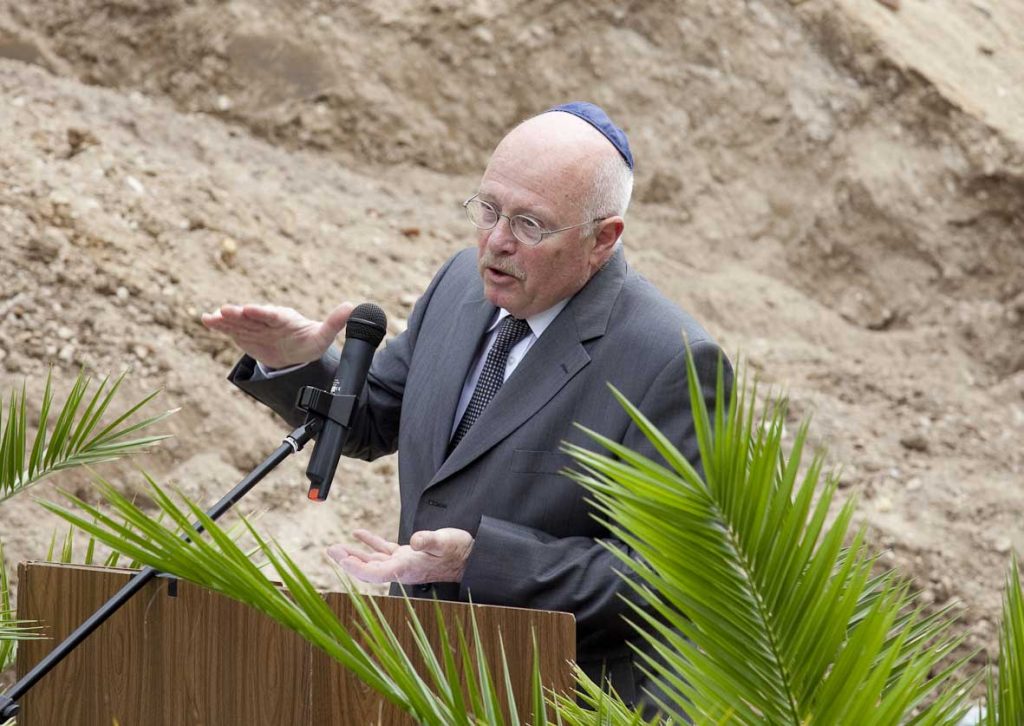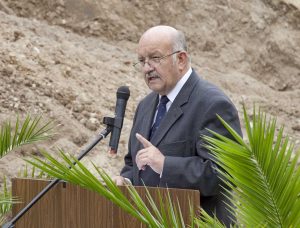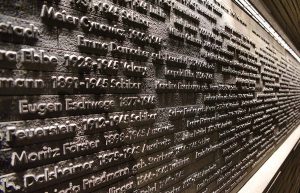
Dr. Jacob Gutmark at the Laying of the Foundation Stone
(Photographer: Oliver Hebel)
Honored attendees,
For each of us, names are more than just a tool for everyday communication. We use our names to express pride and, at times, resentment toward our heritage. For Jews, it is no different. Even the Jews in ancient Egypt, in bondage and diaspora, kept their Jewish names. It has been so up to the present. Hereby the possibility was given to remain a coherent people and to be worthy of redemption.
The Jewish name is for us the connection to the Almighty. Since, according to the Kabalah, the name with its Hebrew letters substantially determines the destiny of a Jewish child, the parents giving the name experience a prophetic inspiration.
Jewish names reflect more clearly than anything else, the changeful history of the Jewish people through millennia of persecution and expulsion,. Each new environment with the new language and new customs also had consequences for the choice of names. Despite new names, the old names of the forefathers were held on to in parallel out of a deep feeling for tradition.
A Jewish boy receives his name at circumcision on the eighth day after his birth, a girl at the first opportunity in the synagogue. Our name is the key, also for religious matters, to decodification of our social status and role; the name can also give information about inner-community functions. It accompanies us Jews from the moment we are named and until our death.
The most important element then, mentioned in every tombstone inscription, is the name of the deceased. After the name, the date of death is the essential element of a Hebrew tombstone inscription. The date of birth, as well as the inclusion of favorable attributes of the person (so-called eulogy) are not mandatory. The introductory formula “here is buried” and the final blessing: “His/her soul be bound in the bundle of life”, are placed, in initials, as a matter of course. The important functions of a person within the community are often emphasized. They are the basic conditions for remembering a certain person, to commemorate him/her.
On that night, almost 72 years ago, here and in the whole of Germany, the cultural and social destruction of Jewish life began in an unmistakable way, and, as we know, continued in the following years in a thousand times more cruel and inhuman ways.
Our ancestors, including the Jewish people from Wiesbaden, took too many memories with them to the extermination or–if there was one–to the grave‒irrevocably. They were also denied the continuaton of their human line, to found families, to have children. Deprived of their right to be human and Jewish, to live.
For those who had been denied all this, the prophet Isaiah (56/5) spoke long before our time: “To them I give in my house, within my walls, a monument and a memorial better than sons and daughters; I give them everlasting names that will never be blotted out.” This saying will always be on the information board there.
With the commemoration and remembrance work initiated here today, attached to the names of the Nazi victims, God willing, a monument and a memorial (Yad Vashem) will be established, which will not remain encoded only for an elite. Rather, it will remain accessible to a wider class of people forever. It will help to overcome threshold fears of people in this country, to surrender to the memory of the horrors of that time, to learn from it.
The names of the group of decent Jewish people torn out of the cityscape will bring the truth a little closer, give the victims back a piece of dignity.
Shalom!
Dr. Jacob Gutmark
Member of the Board of the Jewish Community Wiesbaden

